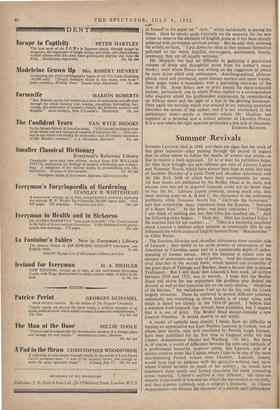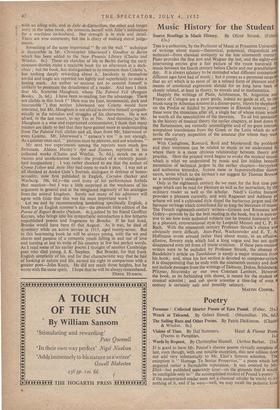Summer Revivals
STEPHEN LEACOCK died in 1944, and there are signs that the work of this great humorist—after passing through the period of neglect that so often seems to follow the deaths of writers and artists—is due to receive a fresh appraisal. Or so at least his publishers hope, for they have brought out new editions not only of Literary Lapses and Nonsense Novels, which have always been kept in print, but also of Sunshine Sketches of a Little Town and Arcadian Adventures with the Idle Rich, both of which have been unobtainable for years. All four books are published by the Bodley Head at 6s. each, and anyone who has yet to discover Leacock could not do better than to buy the lot. Literary Lapses contains, among much else, that most moving essay on A, B and C, the, characters in the arithmetic problems, while Nonsense Novels has " Gertrude the Governess" and that remarkable diary translated from the Russian, " Sorrows of a Super Soul." In the latter, one entry concludes : " Tonight I can think of nothing else but that Otto has touched me." And the following entry begins : " Next day. Otto has touched \fattier 1 He touched him for ten roubles . . ." There is a masterful simplicity about Leacock's method which reminds us continually that he has influenced the whole course of English humour from" Beachcomber" to Gillie Potter.
The Sunshine Sketches and Arcadian Adventures show another side of Leacock ; they testify to his acute powers of observation of the American or Canadian scene and to a considerable depth of under- standing of human nature. Here the humour is mixed with an element of seriousness and even of pathos. And the chapters on the rival churches in the second book, which remind one irresistibly of the great days of Talmage and Beecher, have a flavour that is almost Trollopean. But I still think that Leacock's best work, all written between 1910 and 1925, was in parody. I hope that the Bodley Head will revive for our enjoyment the problem play Behind the Beyond, as well as that immortal skit on the early cinema, " Madeline of the Movies," the melodrama Cast up by the Sea and the Greek tragedy Oroastus. These lie scattered in several different volumes; admittedly not everything in those books is of equal value, and much is dated too closely to the 1914-18 period. I believe that a selection from Leacock has already been published, but I suspect that it is out of print. The Bodley Head should consider a new, Leacock Omnibus. It would deserve to sell wildly.
A reader of catholic taste should, I think, have no difficulty in turning an appreciative eye from Stephen Leacock to Colette, two of whose later novels, very well translated by Patrick Leigh Fermor, have been published for the first time in England under the title Chance Acquaintances (Secker and Warburg. 12s. 6d.). But there is, of course, a world of difference between the aims and methods of a professional humoiist, however subtle, like Leacock, and of a serious creative artist like Colette, whom I take to be one of the most discriminating French writers since Flaubert. Leacock, indeed, would have had no patience with the good-for-nothing men upon whom Colette lavishes so much of her artistry ; he would have punctured them neatly and looked elsewhere for more rewarding comic material. Colette's method is very different ; she observes intently in the world of love and sex which she has studied so carefully, and theri exposes ruthlessly with a surgeon's precision, In Chance Acquaintances she dissects the character of a middle-aged philanderer with an ailing wife, and in Julie de Carneilhan, the other and longer story in the sable book, she concerns herself with Julie's infatuation for a worthless ex-husband. Her strength is in style and detail. There are wise comments, but she is chary of making moral judge- ments.
Something of the same impersonal " fly on the wall " technique is discernible in Mr. Christopher Isherwood's Goodbye to Berlin which has been added to the New Phoenix Library (Chatto and Windus. 6s.) These six sketches of life in Berlin during the early nineteen-thirties make a readable book for an afternoon in a deck- chair ; but the book, less distinguished in its treatment than Colette's, has nothing deeply rewarding about it. Incidents in themselves sordid and tragic are reported too lightly and superficially to make a lasting mark. An author so anxious not to commit himself is unlikely to penetrate the detachment of a reader. And here I think that Mr. Somerset Maugham, whose The Painted Veil (Penguin Books. 2s. 6d.) I have been re-reading, has the advantage. There are clichés in this book (" Here was the East, immemorial, dark and inscrutable ") that neither Isherwood nor Colette would have tolerated, but Mr. Maugham is not afraid to involve himself sympath- etically in the mistakes and struggles of his characters. He is not afraid, in the last resort, to say Yes or No. And therefore,r_as Mr. Maugham is a wise and experienced commentator, I think that many . readers are likely to feel that they have gained more in understanding from The Painted Veil, clichés and all, than from Mr. Isherwood or even Colette. Mr. Isherwood's " camera's eye " is not enough. As a painter once said, " pictures must be pictures, and not windows." My next two experiments among the reprints were much less fortunate. Aldous Huxley's Ape and Essence; reprinted in his collected works (Chatto and Windus. 7s. 6d.), struck me as a vicious and unwholesome book—the product of a violently jaund- iced imagination ; I was rather shocked to see that the author of Crome Yellow and Antic Hay had come to such a pass. I was not at all shocked at Andr6 Gide's Socratic dialogues in defence of homo- sexuality, now first published in English, Corydon (Seeker and Warburg. 10s. 6d.)—the cool irony of his performance forbids that reaction—but I was a little surprised at the weakness of his argument in general and at the misplaced ingenuity of his analogies from the animal kingdom. Surely not many of his admirers will agree with Gide that this was his most important work ? Let me end by recommending something specifically English, a book for an English summer's day—the pleasant little edition of the Poems of Rupert Brooke (Nelson. 4s.), edited by his friend Geoffrey Keynes, who brings into his sympathetic introduction a few hitherto unpublished poems and fragments by .Brooke. If he had lived, Brooke would have been 65 this August. As *it was, he died of dysentery while on active service in 1915, aged twenty-seven. But in this heartening book he will be always young, with the wit and charm and passion of a romantic youth falling in and out of love and turning at last to write of his country in few but perfect words. As I read some of his earlier poems I thought of another Cambridge poet who died young, J. K. Stephen. But Brooke, for that frank English simplicity of his, and for that characteristic way that he had of looking at nature and life, earned his right to comparison with a greater poet—John Keats. He did not reach those heights, but he wrote with the same spirit. I hope that he will be always remembered.
DEREK HUDSON.



























































 Previous page
Previous page